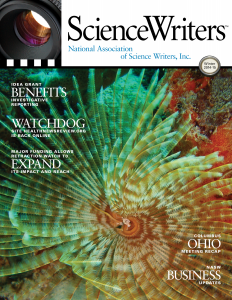By Adam Marcus and Ivan Oransky
After more than four years, 2,000 posts, and incredible responses from the scientific community, we are thrilled to announce that The Center For Scientific Integrity, a not-for-profit corporation we established, has been awarded a $400,000 grant from the MacArthur Foundation to expand the work of Retraction Watch.The goal of the grant — $200,000 per year for two years — is to create a comprehensive and freely available database of retractions, something that doesn’t now exist. As noted in our grant proposal, this is “a gap that deprives scholarly publishing of a critical mechanism for self-correction.”
While we’re currently able to cover somewhere around two-thirds of new retractions as they appear, more resources were needed for a comprehensive database. Here’s more from the grant proposal:
The main benefit would be that scientists could use it when planning experiments and preparing manuscripts to make sure studies they would like to cite have not been the subject of a retraction, correction, expression of concern or similar action. Retracted studies are often cited as if they were still valid (for data, see http://bit.ly/1zuxk4D) because publishers are not very efficient at notifying readers of retractions. And even when retractions are easy to find, the notices that accompany them are often opaque or misleading.
This resource would be vital for the academic community and is one about which we frequently are asked. The biotech and pharmaceutical industries also have a financial incentive to use this database. For example, two analyses — one by Bayer, another by Amgen — found that most compounds the companies licensed did not perform in the lab as described in the literature.
Investigators studying research integrity could use Retraction Watch data to explore questions related to the nature of retractions, as Fang, Casadevall and Steen did in 2012 and journalists could use it to add important detail and context to their articles. Institutions could use it in their inquiries about staff; government agencies could use it in their own investigations.
The funding will allow the hiring of a reporter, an editor, and a database developer. (Retraction Watch remains a volunteer activity for the two of us, with any honoraria and payment for writing going toward expenses, including staff salaries.)
In fact, we’ve already hired reporter Cat Ferguson, with whose byline readers will be familiar by now. Thanks to the generosity of Retraction Watch readers, we were able to hire Cat as an intern last summer. From day one, her work was terrific, and so when we had the chance in October, we made her a full-time employee.
In addition to the database, the grant will allow us to write more for other outlets, taking deeper dives, as we did in “The Peer Review Scam” for Nature (Nov. 26, 2014).
Our profound thanks to the MacArthur Foundation and our readers who have supported us, critiqued us, sent us tips, contributed financially, and much, much more. We’re eager to begin this new chapter.
Adam Marcus, managing editor of Gastroenterology & Endoscope News, and Ivan Oransky, vice president and global editorial director of MedPage Today, are the cofounders of Retraction Watch. Oransky discussed the MacArthur Foundation grant on BioCentury This Week.
(NASW members can read the rest of the Winter 2014-15 ScienceWriters by logging into the members area.) Free sample issue. How to join NASW.

